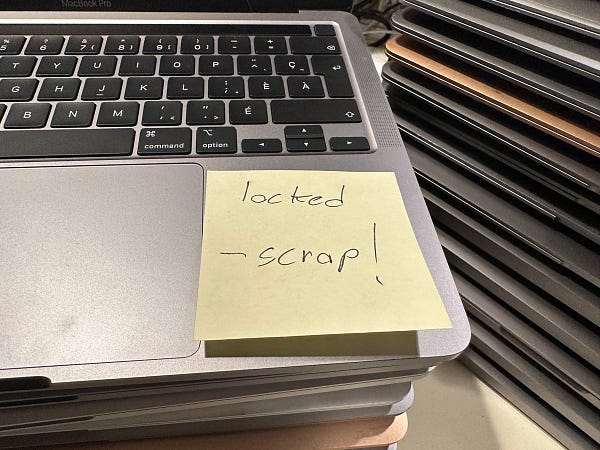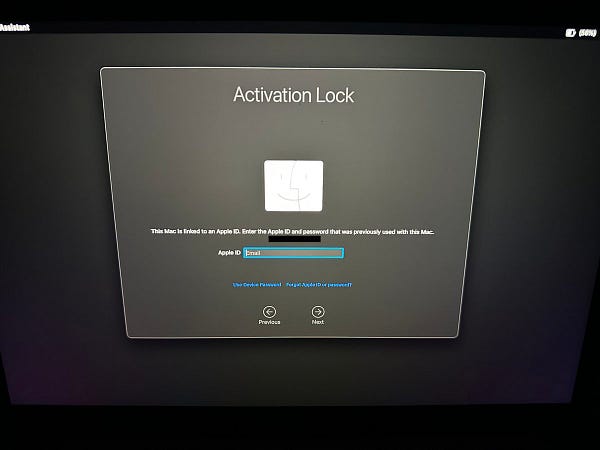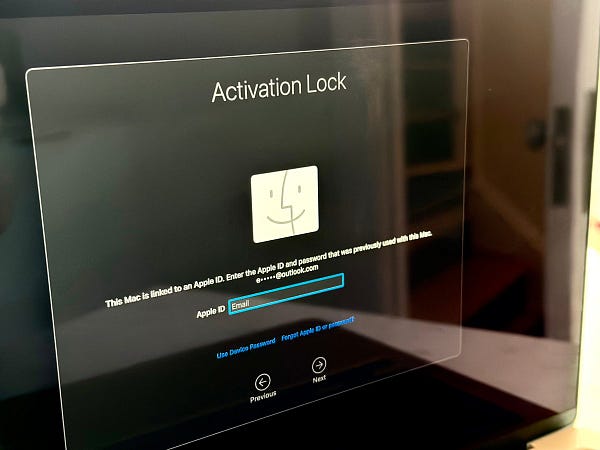Activation locks send working Macbooks to the trash- Week in Repair
Apple's embrace of silicon-based activation locks for Macbooks is sending millions of fully functional devices to the landfill. Also: HBR digs into the 'what next' of right to repair laws.
Nearly new Macbooks headed to the trash because of activation lock
Barely used and fully functional Apple MacBooks, some as new as 3 years old, are being scrapped for parts and sent to landfills because of a security feature that makes the devices impossible to refurbish, according to John Bumstead (@RDKLInc), a repair professional who called attention to the growing stacks of perfectly functional M1 MacBooks in his repair shop. The MacBooks can’t be restored and re-sold (or donated) because of an activation lock feature, first introduced in 2018, that is now standard and that binds the device to an Apple user’s account, making it impossible for anyone but the account owner to access the machine - even after the data has been wiped.
While that’s great for user security, its a plague on the secondhand market like recyclers and refurbish-ers, who receive stacks of used Macbooks discarded by companies, governments and consumers. The security features are so “formidable,” Bumstead told Vice, that these companies have few options but to salvage whatever parts they can from the fully functional Macbooks and then “grind the Activation locked logic boards into carcinogenic dust.”
In the meantime, the Activation lock Tweet has garnered lots of media attention, including this article in Macworld and even a quasi- hit piece in Apple Insider that paints Bumstead as some kind of dumpster diver looking to expose people’s data. (WTF Apple Insider??)
Echoing points that are often made in discussions of right to repair, Bumstead notes that “recycling” (aka scrapping) devices is a far worse outcome than refurbishing and re-using them: extending their useful life and keeping toxic chemicals out of landfills. Security doesn’t need to be an impediment to repairability and re-usability, and Apple should set up systems to support refurbishers like Bumstead in unlocking used devices so they can be resold or donated.
We asked Apple to comment on Bumstead’s complaints, but Apple has yet to respond.









HBR: right to repair might not work, because manufacturers suck.
An article over at the prestigious Harvard Business Review takes on the right to repair issue, makes some interesting observations and makes some dubious conclusions.
The article by Luyi Yang, Chen Jin, and Cungen Zhu contemplates the market response of manufacturers, should right to repair laws go into effect. The researchers posit that laws that promote repair of devices may drive manufacturers to practices that have the opposite effect of those intended by repair advocates.
Right to repair laws may disrupt OEM business models, the authors note. Manufacturers, they say, “might strategically adjust new product prices to mitigate their foreseeable profit loss from the right-to-repair legislation.” For example, they may “raise new product prices to capitalize on easier repair.” Alternatively, manufacturers may “follow a volume strategy and cut new product prices to lure consumers into replacing instead of repairing a glitchy product.” (Reality check: isn’t that OEMs’ existing business model?!)
Such responses can have “nuanced implications for both consumers and the environment.”
The article makes valid points - namely: that right to repair laws will necessarily create a new reality on the ground for device makers and that OEMs will respond to that. And, given that right to repair laws don’t mandate that manufacturers make their products repairable, it is important to understand that they may respond in ways that work against the (pro-consumer, pro-environment, pro-competition) goals and objectives of right to repair backers. Anticipating how they might do so is the job for legislators, the authors say.
Lawmakers should examine specific product categories, including their production cost and environmental impact, and guard against sweeping, one-size-fits-all legislation.
Check out their research paper to read their full argument.
Other News
Maine paving way on repair: This coming November election in the pine tree state will decide if independent repair shops can access proprietary diagnostic and avoid repair roadblocks making it difficult or impossible for owners to fix issues themselves or take vehicles to local repair shops. Maine’s auto repair referendum will decide if New England is truly the poster child for enacting right to repair measures, following in the footsteps of Massachusetts.
75,000 signatures have been collected – that’s over 5% of the state’s population! Plus, it is expected to be politically popular with a similar Massachusetts law winning 75% of votes in 2020 election.
Researchers say Deere violates antitrust laws: The paper argues that John Deere’s use of outsized market power to restrict repair may mean it is in violation of antitrust law. While copyright laws have exemptions for repairing tractors without farmers getting in legal trouble, it does not cover the distribution of tools. Manufacturers like John Deere (who holds a 53% market share in large farm tractors) have started requiring farmers to sign licensing agreements that prohibit modification, reverse engineering, and reproduction of the software, which are necessary steps for understanding, repairing, and improving the equipment.
Fixers in Philly: The Philly Fixers Guild is a collective of about 175 volunteers based in Philadelphia that helps people fix their broken items and teach them how to fix them by hosting Mini Repair Fairs. The guild partners with NextFab, a network of maker spaces throughout Philadelphia, to host Mini Repair Fairs.
Fair-use is paramount in internet-age: The Electronic Frontier Foundation is championing “fair use” in the age of the internet to expand the rights of the public in relation to copyrighted works. Fair use crucial for the internet because the majority of what we do online involves creating, replicating, and/or repurposing copyrighted works. Additionally, technological innovation often builds on existing technologies which may require a license.
Washington Post says Big Tech is resisting open markets: The Washington Post has written a piece covering all the issues we’ve been keeping you up to date on this past year, from tech companies opposing repair to the government policies across the globe solidifying a right repair in different ways. We are happy the paper is finally taking notice.
Republican Senator interested in R2R Republican Senator Joni Ernst discusses the importance of right to repair with KICD/KMRR news – saying:
“I think we will be moving forward in this next Congress and hopefully come up with some good ideas about how we can make it easier to access the information that is needed [for repairs]”
Psychology of ownership: The Ellen MacArthur foundation is writes in favor of a subscription + rental economy. They highlight research finding that only 20% of people are willing to consider renting or leasing products rather than owning them. The foundation argues we should allow this trend to unfold since ending the own product ownership is part of a circular economy that will “unhook economic activity from the extraction of finite resources”, and incentivize producers to design for durability.
💭 Jack’s thought bubble: I am definitely in support of sharing resources to reduce and the negative impacts of consumption, but the stance of this author is unrealistic when you realize BMW’s heated seats subscription is only the beginning in a subscription economy. I can get on board with “an economic model that financially rewards the owner and/or producer for maintaining resources” but don’t agree that the way to do it is by putting more power and agency into the hands of corporations, and weakening consumer power.
PIRG’s six ways to stop planned obsolescence: Lucas Gutterman breaks down PIRG’s top strategies for ending planned obsolescense:
Right to Repair laws should be passed to fix consumer goods.
Consumers should know if a product is repairable before purchasing.
Stop software from limiting repairs to specific manufacturers.
Require removable batteries in products to prevent disposability.
Create minimum service dates for access to repair and parts.
Protect repurposing older tech for new uses.
“Circularity” is the new greenwashing: Cecilia Huang write for our friends at Remake about spotting bullshit when companies say they are going “circular.” The fashion industry is a significant contributor to the climate crisis, producing around 2.1 billion tonnes of GHG emissions in 2018 – and Remake’s 2022 Brand Accountability Report evaluated 58 of the world’s largest companies are not using their revenue to reduce their reliance on constantly churning out new products.
Tweet of the Week


Website of the Week
Looria Reviews is a website entirely dedicated to reviewing products to “find out how long products last, where they break, and how to fix them.”
💡 You can submit reviews here


